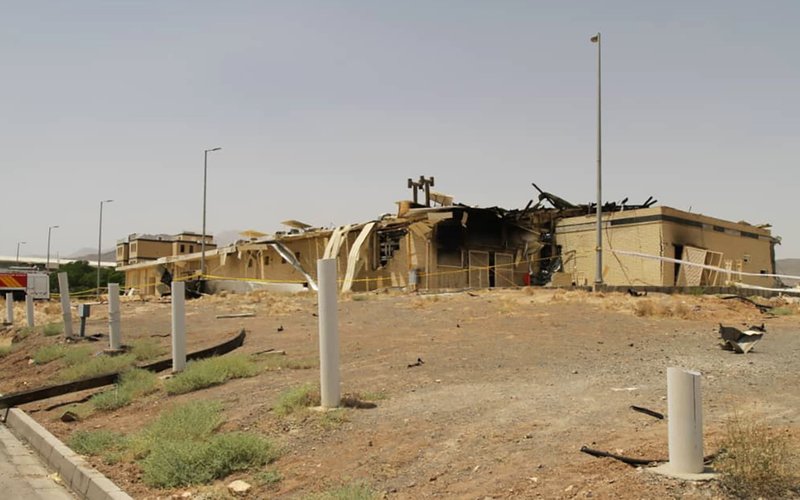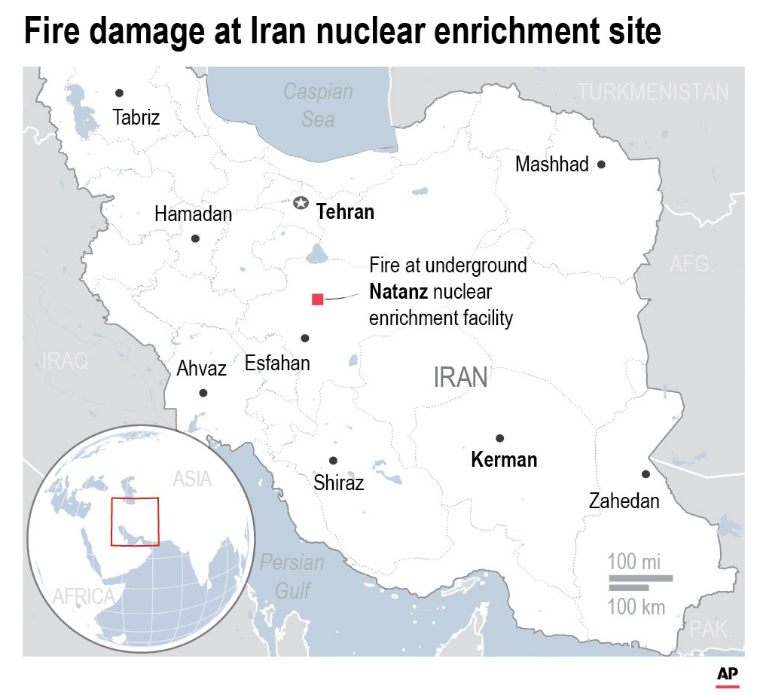
A damaged building after a fire broke out at the Natanz Nuclear Facility, in Isfahan, Iran, July 2, 2020. /Reuters
A damaged building after a fire broke out at the Natanz Nuclear Facility, in Isfahan, Iran, July 2, 2020. /Reuters
With the Natanz nuclear site fire causing significant damage and the cause of the fire not yet clear, Iran said it will build a new structure to offset the repercussions.
A new and more advanced structure will be built at Natanz nuclear facility to replace the one damaged in a recent "incident," said Behrouz Kamalvandi, spokesperson for the Atomic Energy Organization of Iran (AEOI).
"Necessary arrangements have been made to rebuild the damaged shed at Shahid Ahmadi Roshan (Natanz) nuclear facility and a bigger shed with more advanced equipment is to replace it," Kamalvandi said, after saying the fire that broke out at the site last week caused significant damage that could slow the development of advanced centrifuges.
More centrifuge machines were supposed to be produced at the damaged shed, Kamalvandi said, adding that parts of measurement and precision tools in the shed were destroyed and damaged in the "incident."
The "incident" has not caused hindrance in Iran's enrichment work, although it may slow down development and manufacture of advanced machines in the medium term, he said.
"We would make up for this slowdown through round-the-clock work and diligent efforts of our colleagues at the organization," noted the spokesperson.
Kamalvandi said that the fire had damaged "precision and measuring instruments," and that the center had not been operating at full capacity due to restrictions imposed by Tehran's 2015 nuclear deal with world powers. Iran began experimenting with advanced centrifuge models in the wake of the U.S. unilaterally withdrawing from the deal two years ago.
Iran announced on Thursday that the fire that broke out at Natanz nuclear facility caused no damage to the establishment, but affected one of the structures for storing stock items.

A fire has burned a building above Iran's underground Natanz nuclear enrichment facility, though officials say it did not affect its centrifuge operation or cause any release of radiation. /AP
A fire has burned a building above Iran's underground Natanz nuclear enrichment facility, though officials say it did not affect its centrifuge operation or cause any release of radiation. /AP
Iran's Supreme National Security Council said a day later that the cause of the fire had been determined but would be announced later, while three Iranian officials said anonymously that they believed the fire was the result of a cyber attack but did not cite any evidence.
The reference to cyber attack indicates that the suspicion has largely focused on the United States and Israel, as the two countries had launched cyber attacks on Iran's nuclear facilities before a nuclear agreement was signed between Iran and other major powers in 2015.
In 2010, Natanz fell under attack by the computer virus Stuxnet which was believed to have been developed by the U.S. and Israel.
Since the Trump administration's withdrawal from the nuclear treaty brought back tense relations, Iranian officials are now tempted to believe that Washington, along with Iran's archenemy Israel, have restored to their past tactics in sabotaging Iran's nuclear program.
Related reading: Iran's mysterious fire in underground Natanz nuclear site
But a member of the Islamic Revolutionary Guards Corps (IRGC), Iran's regime forces, told the New York Times that an explosive was used and a cyber attack was ruled out as cause of the fire. Meanwhile, a Middle Eastern intelligence official familiar with the matter said Israel was responsible, using a powerful bomb.
Israel, which on Monday launched its new spy satellite that could be used to monitor Iran, previously said it was not always the mastermind behind mysterious incidents in Iran.
"Not every event that happens in Iran is necessarily related to us," Israeli Defense Minister Benny Gantz said on Sunday.
(With input from agencies)